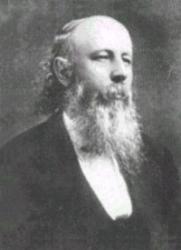But it may reasonably be asked, can it be possible that a large number of men of every generation since Hippocrates, and among them some of the brightest intellects the world has known, should have been engaged in the study and practice of medicine, with no better result than this-a simple vacuity? I admit the rare intelligence and devotion of the laborers. But, in the first place, the task is mightier than any other essayed by man; may it not reasonably require ages to complete its plan? Again, labor, however intelligent and devoted, if misdirected, must fail of its end. If one generation of intellectual giants erect a towering fabric and their equally lusty successors demolish it, what does the third inherit save a heap of rubbish which it may require the best years of its life to clear away.
Generation after generation of wise men labored to construct the physical theory of the universe, yet not until the recent day of Newton did we learn how to begin aright. True, Newton’s predecessors from the earliest ages observed value, but they knew not the magic word wherewith to charm them into order. In like manner, it is not denied that we are indebted to our predecessors for a vast number of isolated facts of incontestable value as materials to be used in the construction of a science of Therapeutics. We are indebted to them also for the elaboration of those subsidiary sciences-Anatomy, Physiology, Pathology, Chemistry and the like-in which, indeed, the great glories of the medicine of to-day have been won, and without which, we cheerfully admit, Therapeutics as a science could not exist.
But it is said that Therapeutics must have advanced inasmuch as the rates of mortality have steadily diminished. One sort of improvement we gladly acknowledge. Simultaneously with the spread of Homoeopathy, Old_school physicians began to learn to abstain from mischievous modes of treatment formerly pursued, and which terribly enhanced the natural fatality of diseases. Professor Bennett, in the introduction to his work on Clinical Medicine, specifies Apoplexy, Pneumonia and Pleurisy, Syphilis, specifies Apoplexy, Pneumonia and Pleurisy, Syphilis, Small-pox, Phthisis, Bright’s disease, and Favus, as diseases in treating which, he says, “great improvements have been made”, and he adduces this as a proof of the advancement of medicine.
A reference to the chapters in which he treats of these diseases shows that he conceives the “improvement in their treatment” to consist in abstinence from methods which were formerly employed and which he clearly proves were very mischievous. For example, Blood-letting in Apoplexy, Pneumonia, Pleurisy, Phthisis and Bright’s disease-the immoderate use of Mercury in Syphilis-heroic medication and external warmth in Small-pox, and avoidance of all internal medication for Favus, which he conceive to be a vegetable parasite. This improvement, then, is purely negative, a very poor ground on which to claim positive advancement in the construction of a science, however deserving of the gratitude of suffering humanity. The formula for improvement of all kinds is, “CEase to do evil; learn to do well.” We admit that the Old-School are learning to obey the former, the negative clause. We invite them to advance and join us in the latter, the positive.
Again, an extended knowledge of the remote cause of disease of the principles of Hygiene has enabled medical men to prevent the occurrence or the spread of many forms of disease. And far be it form us to undervalue, through any love of a newly constructed science of Therapeutics, this branch of a physician’s function, the forestalling or arrest of maladies by Hygienic means.
As increased knowledge in this department of science has enabled us to dispense with therapeutic agents in many cases in which they were formerly resorted to, so we firmly believe that, with the advancement of learning, Hygiene will more and more curtail the boundaries of Therapeutics, until the day shall come when the physician shall be prized as the preserver rather than solely the restorer of health, and shall be consulted respecting the means of preventing rather than solely of curing disease, and the “family doctor” shall be regarded as the confidential adviser, valuable in proportion as he keeps his client out of bed, just as the family lawyer is confided in, for the purpose of keeping his clients out of court! In that day there will be fewer apothecaries.

